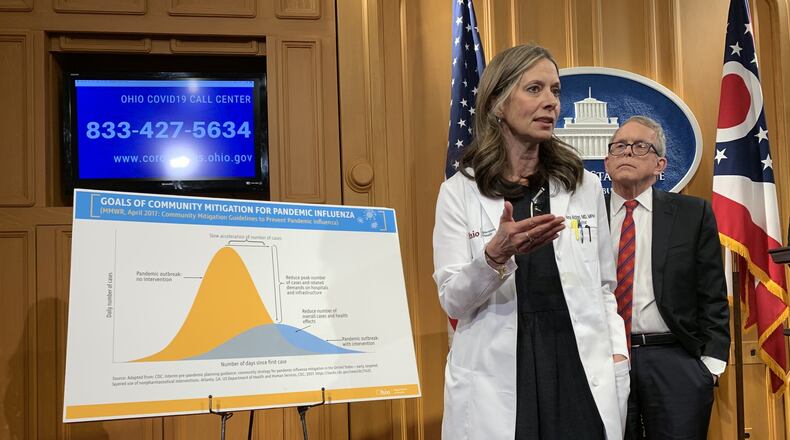>>What is an essential business?
>>What you can still do during stay-at-home order
The order takes effect at 11:59 p.m. today and will remain in place until April 6, unless rescinded or modified, at which time the measure and conditions will be reassessed, state officials said.
The order comes as the number of confirmed COVID-19 cases in Ohio jumped 42% from Saturday to Sunday, rising to 351 from 247, according to the state, and cases more than doubled since Friday.
Confirmed cases in the seven-county Miami Valley region rose to 40 on Sunday, which was eight more than Saturday and more than twice as many as Friday (17).
Counties with confirmed cases included Butler (17), Clark (1), Greene (1), Miami (13), Montgomery (5) and Warren (3), according to the state list. Montgomery County later Sunday reported seven cases.
>>Montgomery Co. Sheriff: Don't call 911 for coronavirus info
Ohioans have not faced an enemy like the coronavirus in 102 years, since the 1918 influenza epidemic, and this extraordinary crisis requires extraordinary action, said Ohio Gov. Mike DeWine.
Staying at home is no longer a suggestion or a recommendation, DeWine said: It is a mandate.
“The lesson of history, time after time, has been: if you don’t do these things early enough, you pay the price,” DeWine said. “The price you pay is a lot of people dying.”
Acton’s order directs Ohioans to stay at home or at their place of residence to help slow and prevent the spread of the coronavirus.
Citizens should “self-isolate” as much as possible, and when outside, they should maintain a social distance of at least six feet from other people, except family or household members, Acton’s order states.
All public and private gatherings occurring outside a single household or living unit are prohibited, with limited exceptions, the order states.
The exceptions to the stay-at-home order are “common sense” and relate to essential activities, DeWine said, like health and safety, acquiring necessary supplies and services, outdoor activities and taking care of neighbors, family members, friends, pets and others.
>>U.S. Sen. Rand Paul tests positive for coronavirus
Non-essential businesses and operations are ordered to cease activities, DeWine said, but certain kinds of essential work and businesses will be allowed to remain open, which are based on Homeland Security definitions.
Businesses that remain open have been directed to follow precautions to keep workers safe, like social distancing and hand-washing measures. The governor also has suggested taking temperatures of employees before they enter the workplace.
Ohioans need to do everything possible to protect front-line workers who are combating the virus and providing food, medicine and other things citizens need to get through this emergency, Acton said.
“I need to not drive to this press conference and see folks going around like business as usual,” she said. “This is not a joke. This is not a drill. We all need to limit this exposure and stop the spread of disease.”
Choices Ohioans make right now will either help save lives or spread the virus, she said.
Italy and other places where the virus has spread rapidly are begging the United States and other countries to learn from their mistakes and act quickly to slow this down, Acton said.
“This is our one shot in this country,” she said.
The order can be enforced by local public health departments and law enforcement, and violations are a second-degree misdemeanor, officials said.
The 351 confirmed cases are just the “tip of the iceberg” of what public health officials are seeing on the ground, and many more confirmed cases are expected, Acton said.
Infected Ohioans range in age from 1 to 91 years old, and the median age is 51, she said. There are confirmed cases in 40 Ohio counties.
Statewide, the spread of the coronavirus has led to 83 hospitalizations and three deaths, according to state data shared Sunday afternoon.
Two people who died after residing in a Miami County nursing home facility were tested for coronavirus but the results were not released by Sunday afternoon.
Essential businesses include grocery stores, pharmacies, supermarkets and places that sell products necessary to the “safety, sanitation and essential operation” of people’s homes and other essential businesses.
They also include charitable groups and organizations that provide food, shelter and other social and important services, religious entities, media companies, gas stations, financial institutions, hardware and supply stores, mail offices, laundry services and carry-out restaurants.
“There are many of you out there who are working on the front lines to provide those essential needs, and we are grateful,” said Ohio Lt. Gov. Jon Husted. “We need you.”
DeWine said that starting Thursday, childcare centers must operate under with pandemic childcare license, which means they can have a maximum of six children per room.
DeWine said that while shared spaces are still allowed with deep cleaning procedures, child care facilities are dissuaded from using common areas. This will be enforced until April 30.
DeWine also said he is asking the Ohio Legislature to approve cancelling state mandated testing this year.
MORE Second resident of Miami County nursing home dies awaiting coronavirus test results
About the Author

